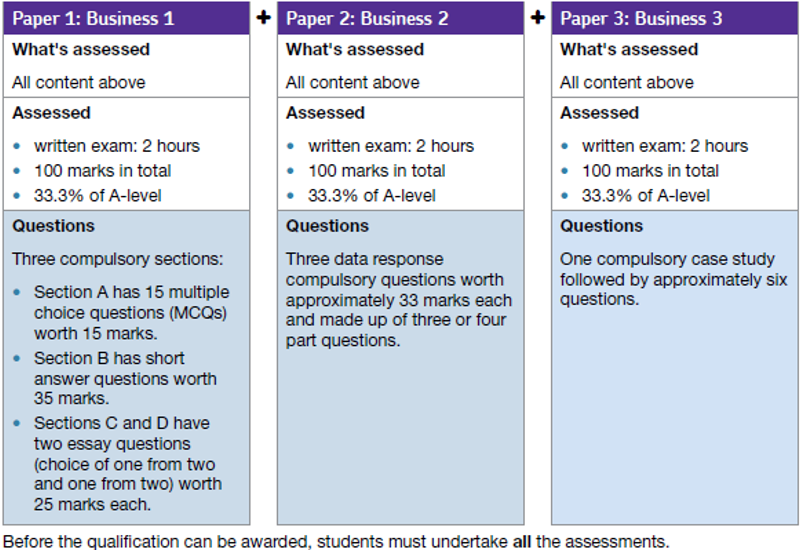Business (A Level)
Introduction to Course
By studying A Level Business students will be engaging with the business world. The AQA specification and assessment encourage students to follow business developments and think critically about contemporary business issues. Most of the assessment material is based on real business situations. By examining and thinking critically about real business situations, students will gain an insight into different contexts which will help them to understand the key issues in any situation and compare and contrast this with other situations and apply their understanding. In addition students will study –
- the interrelated nature of business activities and how they affect competitiveness
- the competitive environment and the markets in which businesses operate
- the influences on functional decisions and plans including ethical and environmental issues
- the factors that might determine whether a decision is successful eg the quality of data and the degree of uncertainty
- how technology is changing the way decisions are made and how businesses operate and compete
- the impact on stakeholders of functional & strategic decisions and their response to such decisions
The study of strategic decision making will build on the study of decision making in the functional areas. Students will consider –
- the impact of technology on strategic decision making
- the influences of Corporate Social Responsibility, ethical and environmental issues on strategic decisions
- the difficulties in forecasting future trends
- the importance of assessing feasibility and risk when making strategic decisions
Exam Board/Specification
AQA, AS Level 7131, A Level 7132
Modules/Units
1. What is business?
2. Managers, leadership and decision making
3. Decision making to improve marketing performance
4. Decision making to improve operational performance
5. Decision making to improve financial performance
6. Decision making to improve human resource performance
7. Analysing the strategic position of a business (A-level only)
8. Choosing strategic direction (A-level only)
9. Strategic methods: how to pursue strategies (A-level only)
10. Managing strategic change (A-level only)
Assessment
AS Level- Paper 1: Exam 1.5 hours (50%) Paper 2: Exam 1.5 hours (50%)

A Level- Paper 1: Exam 3 hours (33.3%) Paper 2: Exam 3 hours (33.3%) Paper 3: Exam 3 hours (33.3%)

Progression Routes
An A Level in Business can develop an enthusiasm for studying business at university by gaining a holistic understanding of business in a range of contexts. It encourages students to develop a critical understanding of organisations and their ability to meet society’s needs and wants by studying business behaviour from a range of perspectives. This course will generate students’ enterprising and creative approaches to business opportunities, problems and issues, as well increase their awareness of the ethical dilemmas and responsibilities faced by organisations and individuals. Students will acquire a range of relevant business and generic skills, including decision making, problem solving, the challenging of assumptions and critical analysis in addition to applying numerical skills in a range of business contexts.
Common course options include: Accounting, Business Administration, Business Analysis, Business Computing, Business Ethics, Business Statistics, Commercial Law, Developing Markets, Economic Principles, Events Management, Facilities Management, Finance, Hospitality, Hotel Management, Human Resources, International Studies, Law Management, Marketing, Operations Management, Property Management, Public Services, Real Estate, Research and Technology.
An A Level in Business will also lead to many opportunities to embark on various Apprenticeship programmes.
Contacts
Mrs R Odedra: [email protected]